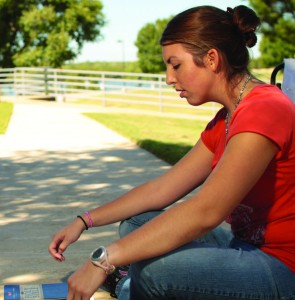By Bethany Peterson/reporter

When a mother returns from a three-week absence and her little girl cannot speak to greet her, big warning flags shoot up.
“She came home and said, ‘Hi, Mary,’ and I tried to speak and nothing came out,” Mary Baze said.
The then 3-year-old Baze began speaking again in three days, but when she attempted to speak, “ahh, ahh, ahh” was often all she could say. Her face contorting and hands groping for a physical hold that would pull the words out of her mouth resulted only in an exasperated “I can’t talk!”
Since that day, the NW student has struggled to overcome a speech disorder. In fourth grade, she was also diagnosed with audio processing disorder, where sufferers cannot process some of the words they hear.
After the initial scare, her parents began the long process to figure out what was keeping Baze from speaking.
“We checked out all the physical reasons,” said Baze’s mother, Eileen Baze.
When hearing and other possibilities checked out fine, speech therapy was the next step.
The speech therapist ruled out stuttering but could not find an official speech disorder that fit the symptoms, Baze said.
“We actually ended up calling it ‘stuck talk,’” she said. “A disconnect would happen somewhere, and the words would not come out.”
In fourth grade, concerns from teachers and Baze’s mother led to discovery of the auditory processing disorder.
“I told her to go to the wood shop and get a hammer off the workbench. She would get to the wood shop and the bench but come back without the hammer,” said Eileen Baze.
When her mother described this to the therapist, the therapist immediately started nodding and said she knew what test Baze needed, Eileen Baze said.
“The test was [for the therapist] to say a string of words and she was able to count the words Mary never processed,” she said. “Mary was getting the gist of the sentence but was missing the word hammer.”
Compared to others with this disorder, Baze has a minimal block, but it’s still large enough to cause major problems.
The processing disorder made it difficult for Baze to follow any kind of step-by-step instructions or procedure because some vital word was missing.
“I learned to tie my shoe when I was 8,” she said. “Math is still hard. If something breaks, it takes me forever, if ever, to figure out how to fix it.”
The treatment for both disorders was intensive and extensive.
“It was a daily, hourly grind for her,” her mother said.
Both disorders could occur at any moment, so there wasn’t a time Baze didn’t have to work on them.
“[Stuck talk] happened a lot in daily conversation,” Baze said. “The way it was treated was to talk with lots of air and very slowly.”
Baze’s whole family learned to speak extremely slowly and exhale words more than pronounce them. This reminded her to slow down and relax her overtight throat muscles, the physical cause of stuck talk.
“I put up signs on the walls around the house to remind people to speak slowly to Mary,” her mother said.
Baze’s older brother joined the effort, though it could be tricky.
“It was difficult to remember to talk slow to other people or my parents in front of Mary or when Mary was in the room,” older brother Rex Baze said. “Talking happens naturally once a person learns how to do it. Overcoming the nature of it was challenging.”
Baze also went to speech therapy once a week from age 3 until she was in seventh grade.
“We went to the speech therapist through Fort Worth ISD because that was the only way it was free,” Baze said.
The therapist used idioms and sequences to work parts of her brain she usually did not use, strengthening her brain as a whole, Baze said.
“I took everything literally, and idioms are not literal,” she said.
The therapist would also show her a picture and ask what should happen first in the picture or ask her to arrange cards in different sequences, Baze said.
Around the house, when Baze would get in a tough spot, her family would ask her, “What are you going to do first?” her mother said.
Earlier grades were easier for Baze, she said. Teachers had time to slowly walk her through step by step, and the focus was on reading, which she calls her gift from God.
“Reading was never a problem,” she said. “God gave me a break on that one.”
Reading off the board helped her follow the teacher’s talk. The visual portion of Baze’s brain was not affected by the processing disorder, so written information was easy for her to understand.
“I am always in the front row,” she said.
Baze’s mother said she took an active role, alerting Baze’s teachers to their part in helping her daughter learn.
“I told them, ‘You’re the teacher, and here is what we are going to do,’” her mother said. “I ran the team.”
At home, Baze’s mother said she explained to her daughter why she struggled in schoolwork and assured Baze she was not stupid.
“I used to describe it to Mary that when you aren’t connecting, you keep trying to connect and you grow around the bad part,” she said.
The mother explained to Baze her head was like a pipe full of concrete and that a message had to be sent through that pipe. To receive the message, Baze would either have to slowly break the concrete out of the pipe or grow another way around the blockage.
“There was some sternness at times,” her mother said, “because she was a kid, and she’ll take the easy way. “
The family’s encouraging phrase became, “Mary, your brains are growing.”
Baze took her own steps too, including volunteering to speak at her eighth-grade graduation. Later, she could not figure out what made her volunteer, but it was worth it, Baze said, though she stuck-talked through the whole thing.
“I faced the fear,” she said. “It was the first time I had ever volunteered for something like that.”
Baze took another step in the middle of a self-pity party.
“There was a time in my life that my talking was really bad. Every word out of my mouth, it would happen,” she said.
“Mom took me to her school for mentally retarded children. I learned to appreciate stupid things like chewing my food. After that, I made a pact with myself and God to never feel sorry for myself again.”
Math and science were the hardest parts of school for her because they are based completely on procedure, Baze said. The math and science portions of the TAKS were especially scary.
“I failed the TAKS test every year till junior year,” she said. “That was something that daunted me.”
Then Baze said she received another gift.
“This [math] teacher was a new teacher at my high school,” she said. “He was the first teacher who would stay as long as I needed in tutoring to make things make sense.”
That year, she passed the math and science sections.
“I called him my TAKS angel,” she said.
Even with the victories, Baze struggled for years to come to grips with the permanency of her stuck talking.
“It took me till four years ago to accept this is the way it is going to be,” she said.
After accepting it, the stuck talking decreased dramatically, Baze said.
“It’s not something I have done, but God did,” she said.
The therapist released her in seventh grade, Baze said. At that point, the therapist said she was processing everything said to her and had tools to move around procedures. Stuck talking still happened, but she knew how to prevent or overcome it.
“You don’t get over it,” her mother said. “You adapt to it. Experience makes it seem like it went away.”
Baze moved through high school and into college utilizing the tools she had learned.
“I have to put myself in situations that help me hear better, use tools that help me learn,” she said.
When a teacher starts rattling off lists of instructions, she is ready.
“As soon as he says, ‘OK, here’s what I want you to do,’ I will already have paper and be writing bullet points,” she said.
Baze also said she always sits front and center in class so she can read the board and see the teacher’s face.
“If I need help, now I find it,” she said.
Speech class in her first semester at TCC was another hurdle. Though she dreaded the days she had to present a speech, she came and did her best, Baze said.
“Other people who do not have a speech issue wouldn’t show up,” she said. “That floored me.”
The fear of stuck talking still increases her tension, increasing the likelihood of it happening, Baze said. Calming herself takes a lot of willpower.
“I make myself not think about it, which is possible,” she said.
She also learned to recognize stuck talk before it happened and to deal with it so only those who know she has it notice anything.
“Usually I don’t make the ‘ahh, ahh, ahh.’ Now, I pause,” she said.
Once afraid to speak to a large group, Baze took over the NW Campus Christian Student Ministries for a graduating friend and now leads the group in Bible study and discussions.
“I was a person who never talked a lot in big groups. Now, I’m teaching two times a week,” she said.
All together, Baze is far removed from what her mother feared while watching her elementary school child struggle.
“Mom thought for a long time that I could not be independent,” she said, “that someone would have to do my finances for me.”
Her brother still worries about her but is confident that Baze will be fine.
“She is starting to venture out on her own and will be exposed to life-changing decisions that must be made very carefully,” he said. “I know she will do good, though.”
Her family credits their faith for her progress, Baze said.
“My mom calls me her little miracle because God brought me through, and he did not have to,” she said.
Baze will have to deal with both disorders for the rest of her life but said she is thankful her parents caught and began working to help her overcome the disorders so soon and for so long.
“It’s not that big a deal, but it could have been,” her mother said.























